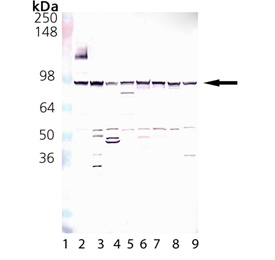Product Details
| Alternative Name: | HSP86, Heat shock protein 90α |
| |
| Host: | Rabbit |
| |
| Immunogen: | Synthetic peptide corresponding to a portion of mouse Hsp86. |
| |
| UniProt ID: | P07901 |
| |
| GenBank ID: | X16857 |
| |
| Source: | Purified from rabbit serum. |
| |
| Species reactivity: | Human, Mouse, Rat
Beluga, Bovine, Dog, Fish, Guinea pig, Hamster, Monkey, Porcine, Rabbit, Sheep, Xenopus
|
| |
| Applications: | IHC, WB
Cell migration, Inhibition assay
|
| |
| Recommended Dilutions/Conditions: | Western Blot (1:1,000, colorimetric)
Suggested dilutions/conditions may not be available for all applications.
Optimal conditions must be determined individually for each application. |
| |
| Application Notes: | Detects a band of ~90kDa by Western blot. |
| |
| Purity Detail: | Protein A affinity purified. |
| |
| Formulation: | Liquid. In PBS containing 0.09% sodium azide and 50% glycerol. |
| |
| Handling: | Avoid freeze/thaw cycles. |
| |
| Shipping: | Blue Ice |
| |
| Long Term Storage: | -20°C |
| |
| Scientific Background: | The Hsp90 family of heat shock proteins represents one of the most abundantly expressed and highly conserved families of cellular chaperones whose expression can be upregulated under conditions of cellular stress, and includes cytoplasmic (Hsp90-alpha/beta), ER (grp94), and mitochondrial (TRAP1) localized members. Structurally, Hsp90 is characterized by an N-terminal ATP-binding domain, a medial substrate-binding domain, and a C-terminal dimerization motif. Hsp90 dimers function in cooperation with cochaperones (e.g. Hsp40, Hsp70, Hop, p23) to stabilize a multitude of client protein substrates, including steroid hormone receptors, protein kinases, and transcription factors. The essential binding and hydrolysis of ATP by Hsp90 is inhibited by ansamycin drugs (e.g. geldanamycin, 17-AAG) which occupy the N-terminal Hsp90 nucleotide-binding pocket. Many Hsp90 client proteins such as erbB2/Her-2, c-raf, bcr-abl, p53, and hTERT, are members of well characterized oncogenic pathways, making Hsp90 inhibitors useful anticancer agents. |
| |
| Regulatory Status: | RUO - Research Use Only |
| |

Western blot analysis of HSP90α, pAb (Prod. No. ADI-SPS-771): Lane 1: MW Marker, Lane 2: HeLa Cell Lysate (heat shocked) (Prod. No. ADI-LYC-HL101), Lane 3: PC-12 Cell Lysate (heat shocked) (Prod. No. ADI-LYC-PC101), Lane 4: 3T3 Cell Lysate (heat shocked) (Prod. No. ADI-LYC-3T101), Lane 5: CHO-K1 Cell Lysate (heat shocked), Lane 6: MDBK Cell Lysate (heat shocked), Lane 7: MDCK Cell Lysate (heat shocked), Lane 8: Vero Cell Lysate (heat shocked), Lane 9: RK-13 Cell Lysate (heat shocked)
Please mouse over
Product Literature References
Vascular endothelium deploys caveolin-1 to regulate oligodendrogenesis after chronic cerebral ischemia in mice: Y. Zhao, et al.; Nat. Commun.
13, 6813 (2022),
Abstract;
Increased Tenascin C, Osteopontin and HSP90 Levels in Plasmatic Small Extracellular Vesicles of Pediatric ALK-Positive Anaplastic Large Cell Lymphoma: New Prognostic Biomarkers?: F. Lovisa, et al.; Diagnostics (Basel)
11, 253 (2021),
Abstract;
Full Text
The IMiD target CRBN determines HSP90 activity toward transmembrane proteins essential in multiple myeloma: M. Heider, et al.; Mol. Cell
81, 1170 (2021),
Abstract;
Cancer stem-cell marker CD44v9-positive cells arise from Helicobacter pylori–infected CAPZA1-overexpressing cells: H. Tsugawa, et al.; Cell. Mol. Gastroenterol. Hepatol.
8, 319 (2019),
Abstract;
Full Text
CAPZA1 determines the risk of gastric carcinogenesis by inhibiting Helicobacter pylori CagA-degraded autophagy: H. Tsugawa, et al.; Autophagy
15, 242 (2019),
Abstract;
Full Text
Extracellular hsp90α clinically correlates with tumor malignancy and promotes migration and invasion in esophageal squamous cell carcinoma: X. Wang, et al.; Onco. Targets. Ther.
12, 1119 (2019),
Abstract;
Full Text
Heat shock protein 90 is downregulated in calcific aortic valve disease: J. Weisell, et al.; BMC Cardiovasc. Disord.
19, 306 (2019),
Abstract;
Tau protein aggregates inhibit the protein-folding and vesicular trafficking arms of the cellular proteostasis network: A. Yu, et al.; J. Biol. Chem.
294, 7917 (2019),
Abstract;
Synergistic role of HSP90α and HSP90β to promote myofibroblast persistence in lung fibrosis: P.S. Bellaye, et al.; Eur. Respir. J.
51, 1700386 (2018),
Abstract;
Molecular and functional crosstalk between extracellular Hsp90 and ephrin A1 signaling: A. Daoud, et al.; Oncotarget
8, 106819 (2017),
Abstract;
Full Text
UGGT1 enhances enterovirus 71 pathogenicity by promoting viral RNA synthesis and viral replication: P.N. Huang, et al.; PLoS Pathog.
13, e1006375 (2017),
Abstract;
Full Text
A novel HSP90 inhibitor–drug conjugate to SN38 is highly effective in small cell lung cancer: A.V. Gaponova, et al.; Clin. Cancer. Res.
22, 5120 (2016),
Abstract;
Full Text
Alpha B-Crystallin Protects Rat Articular Chondrocytes against Casein Kinase II Inhibition-Induced Apoptosis: S.W. Lee, et al.; PLoS One
11, e0166450 (2016),
Abstract;
Full Text
HSF1 critically attunes proteotoxic stress sensing by mTORC1 to combat stress and promote growth: KH. Su, et al.; Nat. Cell Biol.
18, 527 (2016),
Abstract;
Full Text
Oxidation and interaction of DJ-1 with 20S proteasome in the erythrocytes of early stage Parkinson’s disease patients: Y. Saito, et al.; Sci. Rep.
6, 30793 (2016),
Application(s): SDS-PAGE and 2D-PAGE for western blotting,
Abstract;
Full Text
Linking HSP90 target occupancy to HSP70 induction and efficacy in mouse brain: K. Thirstrup, et al.; Pharmacol. Res.
104, 197 (2015),
Application(s): Immunoblot analysis using mouse cell and tissue homogenates,
Abstract;
Inhibiting heat shock protein 90 (HSP90) limits the formation of liver cysts induced by conditional deletion of Pkd1 in mice: Z.B. Smithline, et al.; PLoS One
9, e114403 (2014),
Abstract;
Full Text
Distinct roles of molecular chaperones HSP90α and HSP90β in the biogenesis of KCNQ4 channels: Y. Gao, et al.; PLoS One
8, e57282 (2013),
Abstract;
Full Text
Hectd1 regulates intracellular localization and secretion of Hsp90 to control cellular behavior of the cranial mesenchyme: A.A. Sarkar, et al.; J. Cell. Biol.
196, 789 (2012),
Abstract;
Full Text
Secreted Hsp90 is a novel regulator of the epithelial to mesenchymal transition (EMT) in prostate cancer: M.W. Hance, et al.; J. Biol. Chem.
287, 37732 (2012),
Abstract;
Full Text
A novel extracellular Hsp90 mediated co-receptor function for LRP1 regulates EphA2 dependent glioblastoma cell invasion: U. Gopal, et al.; PLoS One
6, e17649 (2011),
Abstract;
Full Text
Identification of heat-shock protein 90 beta in Japanese encephalitis virus-induced secretion proteins: C.Y. Hung, et al.; J. Gen. Virol.
92, 2803 (2011),
Abstract;
Extracellular heat shock protein-90α: linking hypoxia to skin cell motility and wound healing: W. Li, et al. ; EMBO J.
26, 1221 (2007),
Application(s): IA, Cell Migration using human culture supernatants,
Abstract;
Male fetal germ cells are targets for androgens that physiologically inhibit their proliferation: C. Racine, et al. ; PNAS
104, 3615 (2007),
Application(s): IHC using mouse tissue,
Abstract;
The inhibitory action of sodium arsenite on lipopolysaccharide-induced nitric oxide production in RAW 267.4 macrophage cells: a role of Raf-1 in lipopolysaccharide signaling: T. Yokochi, et al. ; J. Immunol.
166, 2011 (2001),
Application(s): WB using mouse samples,
Abstract;
Related Products










